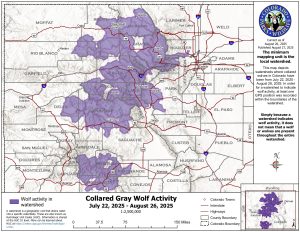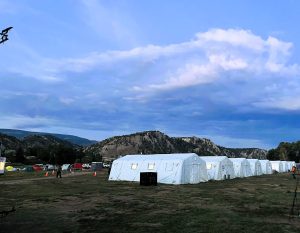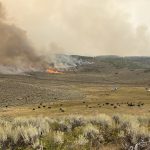Congressional action needed to fill lake at Minturn
An act of Congress
Besides making an allowance to fill Bolts Lake, a bill by Colorado Representatives Jared Polis, Scott Tipton and Doug Lamborn also:
• Enables the U.S. Forest Service to expand the Arapaho National Forest in Summit County.
• Resolves a land dispute between the feds and a land owner in the Rifle area.
• Conveys 320 acres on the west side of Pikes Peak to the U.S. Forest service in exchange for another parcel near the Broadmoor Hotel.
MINTURN — A map-maker’s slip in 1980 needs to be resolved to bolster Minturn’s water supply. Fixing that slip will require an act of Congress.
The slip came when the headgate of Bolts Ditch was put about 350 feet inside the Holy Cross Wilderness Area. That ditch, fed by nearby Cross Creek, fills Bolts Lake via gravity. That’s important because any other way to fill the lake from Cross Creek would require pumping the water. That’s prohibitively expensive.
Bolts Lake sits on private property and is currently owned by the Battle Mountain Co. The lake has been unused for years, but that could change if Battle Mountain ever develops its property and expands the lake.
If a development plan is ever approved, then Bolts Lake will be a key part of Battle Mountain’s water storage system. The town would also benefit, since it has the legal right to store water there.
Minturn Town Manager Willie Powell said the town can use about one-third of the lake’s capacity, if it’s repaired and expanded. That would, in part, give the town more control over its water supply. It would also save the town about $80,000 per year that it now pays to store water elsewhere to help maintain streamflows.

Support Local Journalism
Beginning the process
But access to the ditch and its headgate is essential. That, though, will require Congressional action to exempt that narrow strip of land from federal wilderness regulations.
Minturn Mayor Matt Scherr said it’s unlikely that the wilderness boundary would be re-drawn to accommodate the ditch. Instead, a bill recently introduced by Rep. Jared Polis, the Boulder Democrat who represents that part of Eagle County, would exempt the ditch from wilderness rules. That would allow the use of heavy equipment to repair and maintain the ditch.
Polis introduced a similar bill in 2016. It passed the House of Representatives, then stalled before final approval.
This year’s bill, co-sponsored by Republicans Doug Lamborn and Scott Tipton, who represents about two-thirds of Eagle County, includes other pieces of federal land adjustments in the state.
If this bill passes — and it’s been introduced by members of both parties in a year without a November election — that would be just the first step in a long process.
Development at Battle Mountain
Perhaps the biggest issue is the future of Battle Mountain and its potential development.
Most of Battle Mountain is private property, and has in the past decade been subject to a few development plans.
It was first envisioned as a private ski resort before the 2008 national economic slump hit. Developer Bobby Ginn soon after lost control of the property.
Battle Mountain Co., which currently controls the property, last year proposed an ambitious plan for the area that included land exchanges with the U.S. Forest Service. Those exchanges can take years, but public opposition in town stopped the trades before the federal process could begin.
Battle Mountain is now talking with the town about a proposal that would put relatively few homes atop the mountain, with more homes around the lake. Sale of the expensive homesites would generate revenue for the project on the valley floor.
Scherr said that Battle Mountain recently came for the first time to the Minturn Town Council with that re-vamped proposal.
That plan may start the development approval process this year, and Scherr said the town has made some amendments to its zoning codes to allow those changes.
Ditch is key
If the Battle Mountain proposal is approved, then work on Bolts Lake will follow at some point.
“They’re currently our mechanism for getting (Bolts Lake) done,” Scherr said. “We don’t see any way other than development to getting there.”
If the lake is eventually enlarged and filled, then there could be some extra storage capacity. That’s important, too. Most of the water supply in the upper valley is supplied by streamflow. A town or water district using water that way is required to ensure streamflows are maintained at a minimum level in low-flow periods. That water usually comes from reservoirs, and space in those facilities is at a premium.
“Everybody loves extra storage,” Scherr said.
This is all several years in the future. Even with a groundwork laid, changing the way water flows and is stored in Colorado is complicated.
But if anyone is ever able to fill Bolts Lake, the ditch is the key. And that means Congress needs to agree.











